GARDENING SUCCESS: Work in Your Garden Week by Week  Jessie Peabody Frothingham & Stephanie Pitman "I doe hold it in the Royall Ordering of Gardens, there ought to be gardens for all the months of the year; in which sev erally things of beauty may be there in season." Bacon.
Jessie Peabody Frothingham & Stephanie Pitman "I doe hold it in the Royall Ordering of Gardens, there ought to be gardens for all the months of the year; in which sev erally things of beauty may be there in season." Bacon.  GARDENING SUCCESS Work in Your Garden Week by Week Original Copyright, 1913 By DUFFIELD & COMPANY 2013 Updated and Published by: Stephanie Pitman ISBN:978-1-62590-532-1 This book is a product of its time and may not reflect the values of the current time. The information is for general information purposes only to aid in your garden. All Rights Reserved. No part of thisparticular book may be reproduced in any form or by any means, without permission in writing from the author. Disclaimer and Terms of Use: The author assumes no liability or responsibility for damage or injury to you, other persons, or property arising from any use of any product, information, idea, or instruction contained in the the content of this book.
GARDENING SUCCESS Work in Your Garden Week by Week Original Copyright, 1913 By DUFFIELD & COMPANY 2013 Updated and Published by: Stephanie Pitman ISBN:978-1-62590-532-1 This book is a product of its time and may not reflect the values of the current time. The information is for general information purposes only to aid in your garden. All Rights Reserved. No part of thisparticular book may be reproduced in any form or by any means, without permission in writing from the author. Disclaimer and Terms of Use: The author assumes no liability or responsibility for damage or injury to you, other persons, or property arising from any use of any product, information, idea, or instruction contained in the the content of this book.
Reliance upon information contained in this material is at the readers own risk. The author makes no representations or warranties of any kind, express or implied, about the completeness, accuracy, reliability, suitability or availabity with respect to the information in this book. About the Pictures: All pictures were generated using personal photography, clipart and public domain works. If a work has not been credited properly please contact the author. Created in the United States of America E-Book Edition, April 2013 PREAMBLE This book is full of advice. If you do not like advice do not read the book.
But if you do read it, I hope you will not say, as Mr. Warner did to " Polly: "What might have become of the garden if your advice had been followed, a good Providence only knows ! " "Success is wholly in the gardener writes Sir William Temple. Success is not a cultivated flower. Do not fancy that by following directions, you can attain it. The secret of success is in you. Love has more to do with it than rules love of the thing you are striving for.
So-called in tuition is a trump card, but intuition is noth ing more subtle than swift understanding. Some would say that luck is a large element. There is no such thing as luck it means that you have hit upon natural laws of which you were ignorant; and knowledge is surer. So the elements of success are love, under standing, and knowledge, with the addition of work and will : the determination to suc ceed. Flowers grow for those who love them. Like children, animals, and all of Nature's creatures whose instinct is stronger than their intellect (and I do not include women in this category), they respond uncon sciously to affection.
When engaging with my publisher to gather week by week the fruits of our gar den experience I was particularly enjoined to be practical, not literary; to offer facts, not fancies; to converse soberly on plants and fertilizers, not to sing of the intoxication of Spring; to tell, not the delights of a gar den, but how to make a garden. And, so far as is humanly possible, this will be the plan of the book to offer practical sug gestions to beginners who are wholly igno rant of gardening. Those who know about gardens will find nothing new; to the initiated, the book will serve merely as a weekly reminder. And for this week by week arrangement of the work I assume complete accountability, and am ready to bear censure and criticism. It will rarely come out right. It ought to work, and would, if we owned such a thing as a climate.
But with our volatile Ameri can weather the most one can expect is to hit the mark once in five years. Still, I expect my arrangement to be exceedingly popular, because it assumes, under existing conditions, a large degree of intelligence on the part of the reader and gardener. He must use his brains. I am offering him merely an ingenious mechanism a gauge to be moved backward or forward according to the differences of place, soil, latitude, alti tude, rain-fall, the idiosyncrasies of the sea son, the whims of the weather, the pranks of the mad-cap months, and of capricious spring who plays hide and seek with them. This is not a loophole to escape condemna tion, for so great an authority as John Bur roughs says : " From what fact or event shall one really date the beginning of Spring? The little piping frogs usually furnish a good starting point. One Spring I heard the first note on the 6th of April; the next on the 27th of February....
In fact, all signs and phases of life in the early season are very capricious, and are earlier or later just as some local or exceptional circum stance favours or hinders." The mean average has been set, like the weather reports, to fit the latitude of New Jersey and Eastern New York. Spring be gins in Washington four or five weeks earlier and gradually sweeps her beflowered robes northward and westward. She reaches the Middle West and New England about a month after her visit to us in New Jersey. And it takes her some weeks longer to climb the hills. The Garden Magazine, one of our safest guides, tells us to allow ' six days' difference for every hundred miles of latitude." This is a good average, although, taking New York as a pivot, I should be inclined to allow a little less than a week going towards the West and North, and somewhat more than a week moving to the South. In other words the further south you go the greater the difference, the further north and west, the smaller the difference.
Going up in the air, one can allow a week for every five hun dred feet of altitude. Even these mathe matical calculations are subject to the intelli gence of the gardener, and experience is the best teacher. The suggestions in this volume are based mainly on my father's day-book of the gar den, in which he noted month by month what, where, when and how to plant and transplant, changes to be made, his plans and purchases, the firms from whom he ordered, and many suggestive hints drawn from ob servation. They are also based on our own experience in following his work, and in hearing him talk about flowers and plants. He loved flowers, and they grew for him. He was a successful gardener.
My father, in fact, is the real author of this book, as he was the builder of the garden where I learned whatever I know about gardening. J. P. F. Hortus Inclusus, Princeton, New Jersey. Dear Gardening Fans, This book has really helped me to achieve a wonderful garden and enabled me to plan out my time to make my gardern really pop year round.
I hope that you will find the information helpful over time. I have removed some of the information regarding places listed in the original text, because those facilities are no longer in business. I have found simply searching on the internet more effective for finding the type of plants you want, and usually at a reasonable price. I have included a bonus listing of internet companies in the material. Additionally, I have kept many of the original writings and the spellings of that time period and information regarding prices. It is interesting to see the prices on some of the items we still use today, over 100 years ago! Please note: there were a few references to whale oil, which is nonexistent todayvegetable oil is the closest substitute and has been modified in the text.
Thank you for your purchase and best of luck with your gardening experience this year and beyond. Sincerely, S. P. JANUARY January-First Week: How to plan a garden The garden map "I never had any other desire so strong, and so like to Covetousness, as that I might be master at last of a small house and large garden, and there dedicate the remainder of my life to the Culture of them and study of Nature." Abraham Cowley. I felt a wish for one small lot Of meadow land, a garden plot, Beside a clump of wood, and near My door a rivulet running clear. 
Next page
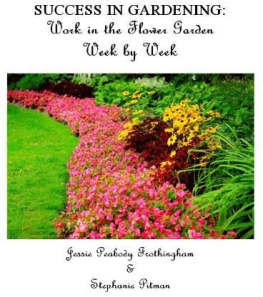

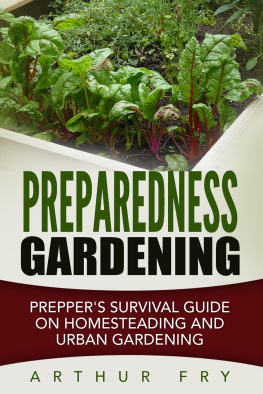
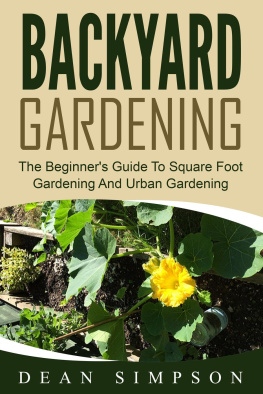

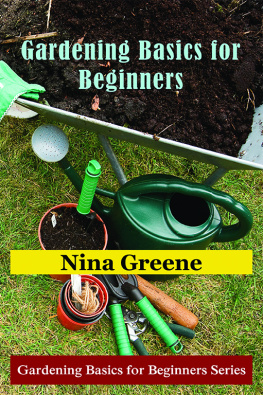
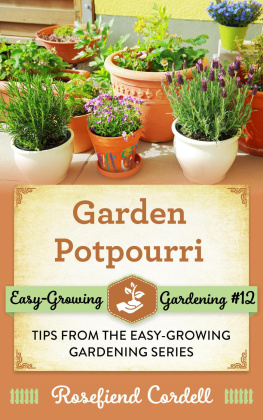
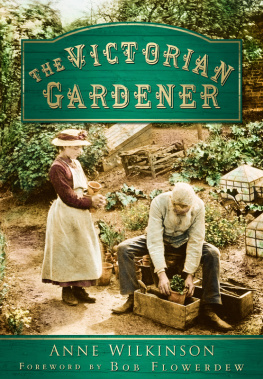

 Jessie Peabody Frothingham & Stephanie Pitman "I doe hold it in the Royall Ordering of Gardens, there ought to be gardens for all the months of the year; in which sev erally things of beauty may be there in season." Bacon.
Jessie Peabody Frothingham & Stephanie Pitman "I doe hold it in the Royall Ordering of Gardens, there ought to be gardens for all the months of the year; in which sev erally things of beauty may be there in season." Bacon.  GARDENING SUCCESS Work in Your Garden Week by Week Original Copyright, 1913 By DUFFIELD & COMPANY 2013 Updated and Published by: Stephanie Pitman ISBN:978-1-62590-532-1 This book is a product of its time and may not reflect the values of the current time. The information is for general information purposes only to aid in your garden. All Rights Reserved. No part of thisparticular book may be reproduced in any form or by any means, without permission in writing from the author. Disclaimer and Terms of Use: The author assumes no liability or responsibility for damage or injury to you, other persons, or property arising from any use of any product, information, idea, or instruction contained in the the content of this book.
GARDENING SUCCESS Work in Your Garden Week by Week Original Copyright, 1913 By DUFFIELD & COMPANY 2013 Updated and Published by: Stephanie Pitman ISBN:978-1-62590-532-1 This book is a product of its time and may not reflect the values of the current time. The information is for general information purposes only to aid in your garden. All Rights Reserved. No part of thisparticular book may be reproduced in any form or by any means, without permission in writing from the author. Disclaimer and Terms of Use: The author assumes no liability or responsibility for damage or injury to you, other persons, or property arising from any use of any product, information, idea, or instruction contained in the the content of this book.